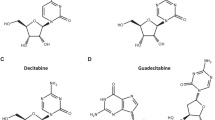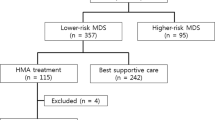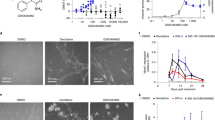Abstract
The class of DNA methyltransferase inhibitors is represented by azacitidine and decitabine. Azacitidine is approved for the treatment of patients in both low- and high-risk subtypes of myelodysplastic syndrome (MDS), and decitabine is currently under review by the FDA. Azacitidine phase III trial data, based upon the Cancer and Leukemia Group B (CALGB) study 9221, showed durable clinical and symptomatic improvement in bone marrow function, a reduction in the risk of leukemic transformation, and significant improvements in the quality of life of patients treated with azacitidine compared with supportive care alone. This study also provided data suggestive of improvement in survival in MDS patients. The experience with decitabine comprises a number of phase I/II studies and a phase III trial yet to be published. While there is a strong base of experience supporting the efficacy of DNA methyltransferase inhibitors in the treatment of MDS, a number of practical issues need to be explored further. These include the optimization of the timing and duration of treatment, and the prediction of response to therapy. Along with current experience, future studies will lead to the development of treatment algorithms, strategies for selecting patients (e.g. according to age, risk, classification, and cytogenetic profile), and the combination strategies, particularly with histone deacetylase inhibitors, in the management of MDS.
This is a preview of subscription content, access via your institution
Access options
Subscribe to this journal
Receive 12 print issues and online access
$209.00 per year
only $17.42 per issue
Buy this article
- Purchase on SpringerLink
- Instant access to full article PDF
Prices may be subject to local taxes which are calculated during checkout





Similar content being viewed by others
References
Gore S (2004) Classification, treatment goals, and management principles for myelodysplastic syndromes. Cancer Control 11 (Suppl 6): 3–6
Bennett JM et al. (1976) Proposals for the classification of the acute leukaemias: French–American–British (FAB) cooperative group. Br J Haematol 33: 451–458
Bennett JM et al. (1982) Proposals for the classifications of myelodysplastic syndromes. Br J Haematol 51: 189–199
Bennett JM et al. (1985) Proposed revised criteria for the classification of acute myeloid leukemia: a report of the French-American-British Cooperative Group. Ann Intern Med 103: 620–625
Bennett JM (2000) World Health Organization classficiation of the acute leukemias and myelodysplastic syndrome. Int J Hematol 72: 131–133
Greenberg et al. (1997) International scoring system for evaluating prognosis in myelodysplastic syndrome. Blood 89: 2079–2088
Stone R (2004) Treatment options for myelodysplastic syndromes. Cancer Control 11 (Suppl 6): 7–10
List A (2004) Methyltransferase inhibitors: changing the treatment algorithm for myelodysplastic syndromes. Cancer Control 11 (Suppl 6): 16–19
Herman JG and Baylin SB (2003) Gene silencing in cancer in association with promoter hypermethylation. N Engl J Med 349: 2042–2054
Anon (online 1 September 05) Press release: approvable letter received from the FDA for Dacogen™. [http://investors.mgipharma.com/phoenix.zhtml?c=73842&p=irol-newsArticle&ID=751908&highlight=] (accessed 12 September 2005)
Kaminskas E et al. (2005) FDA drug approval summary: azacidine (azacitidine™) for injectable suspension. Oncologist 10: 176–182
Kaminskas E et al. (2005) Approval summary: azacitidine for treatment of myelodysplastic syndrome subtypes. Clin Cancer Res 11: 3604–3608
Anon (online 19 May 05) Vidaza label and approval history [http://www.accessdata.fda.gov/scripts/cder/drugsatfda/index.cfm?fuseaction=Search.Search_Drug_Name] (accessed 28 September 05)
Silverman LR et al. (2002) Randomized controlled trial of azacitidine in patients with the myelodysplastic syndrome: a study of the cancer and leukemia group B. J Clin Oncol 20: 2429–2440
Rüter B et al. (2005) Re-treatment results in second remission of MDS with previous response to low-dose 5-aza-2′-doxycytidine (Decitabine). Leuk Res 29 (Suppl): S65
O' Brien S et al. (2005) Decitabine low-dose schedule (100 mg/m2/course) in myelodysplastic syndrome (MDS). Comparison of 3 different dose schedules [abstract]. J Clin Oncol 23: 6545
Wijermans P et al. (2000) Low-dose 5-aza-2′-deoxycytidine, a DNA hypomethylating agent, for the treatment of high-risk myelodysplastic syndrome: a multicenter phase II study in elderly patients. J Clin Oncol 18: 956–962
Garcia-Manero G et al. (2005) Results of a phase I/II study of the combination of 5-aza-2′-deoxycitidine and valproic acid in patients with acute myeloid leukemia and myelodysplastic syndrome [abstract]. J Clin Oncol 23: 6544.
Saba HI et al. (2005) Clinical benefit and survival endpoints from a phase III trial comparing decitabine (DAC) vs. supportive care (SC) in patients with advanced myelodysplastic syndromes (MDS) [abstract]. J Clin Oncol 23: 6543
Burchenal JH and Carter SK (1972) New cancer chemotherapeutic agents. Cancer 30: 1639–1646
Massimo L and Comelli A (1975) New drugs for the therapy of acute leukemia. Minerva Med 66: 2568–2576
Silverman LR et al. (1993) Effects of treatment with azacitidine on the in vivo and in vitro hematopoiesis in patients with myelodysplastic syndromes. Leukemia 7 (Suppl 1): 21–29
Silverman LR (2001) Targeting hypomethylation of DNA to achieve cellular differentiation in myelodysplastic syndromes (MDS). Oncologist 6 (Suppl 5): 8–14
Marcucci G et al. (2005) Bioavailability of azacitidine subcutaneous versus intravenous in patients with the myelodysplastic syndromes. J Clin Pharmacol 45: 597–603
Kornblith AB et al. (2002) Impact of azacitidine on the quality of life of patients with myelodysplastic syndrome treated in a randomized phase III trial: a Cancer and Leukemia Group B study. J Clin Oncol 20: 2441–2452
Najfeld V et al. (2004) The modulating effect of azacitidine (Aza C) on the cytogenetically tracked MDS clone impact survival [abstract]. Blood 104: 1429
Kantarjian HM et al. (1997) Decitabine studies in chronic and acute myelogenous leukemia. Leukemia 11 (Suppl 1): S35–S36
Kantarjian HM et al. (2003) Results of decitabine (5-aza-2′deoxycytidine) therapy in 130 patients with chronic myelogenous leukemia. Cancer 98: 522–528
Pinto A and Zagonel V (1993) 5-Aza-2′-deoxycytidine (decitabine) and azacitidine in the treatment of acute myeloid leukemias and myelodysplastic syndromes: past, present and future trends. Leukemia 7 (Suppl 1): 51–60
Issa JP et al. (2004) Phase 1 study of low-dose prolonged exposure schedules of the hypomethylating agent 5-aza-2′-deoxycytidine (decitabine) in hematopoietic malignancies. Blood 103: 1635–1640
Saiki JH et al. (1978) 5-Azacitidine in acute leukemia. Cancer 42: 2111–2114
Jones PA and Taylor SM (1980) Cellular differentiation, cytidine analogs and DNA methylation. Cell 20: 85–93
Issa JP (2003) Decitabine. Curr Opin Oncol 15: 446–451
Aparicio A and Weber JS (2002) Review of the clinical experience with 5-azacytidine and 5-aza-2′-deoxycytidine in solid tumors. Curr Opin Investig Drugs 3: 627–633
Goffin J and Eisenhauer E (2002) DNA methyltransferase inhibitors — state of the art. Ann Oncol 13: 1699–1716
National Comprehensive Cancer Network (online 21 September 04) Myelodysplastic syndromes Version 1.2005 [http://www.nccn.org/professionals/physician_gls/PDF/mds.pdf] (accessed 7 September 2005)
Cheson BD et al. (2000) Report of an international working group to standardize response criteria for myelodysplastic syndromes. Blood 96: 3671–3674
Cutler CS et al. (2004) A decision analysis of allogeneic bone marrow transplantation for the myelodysplastic syndromes: delayed transplantation for low-risk myelodysplasia is associated with improved outcome. Blood 104: 579–585
Williamson PJ et al. (1994) Establishing the incidence of myelodysplastic syndrome. Br J Haematol 87: 743–745
Ho AY et al. (2004) Reduced-intensity allogeneic hematopoietic stem cell transplantation for myelodysplastic syndrome and acute myeloid leukemia with multilineage dysplasia using fludarabine, busulphan, and alemtuzumab (FBC) conditioning. Blood 104: 1616–1623
US Census Bureau (online 18 March 04) U.S. interim projections by age, sex, race, and Hispanic origin [http://www.census.gov/ipc/www/usinterimproj/natprojtab02a.pdf] and [http://www.census.gov/ipc/www/usinterimproj/natprojtab02b.pdf] (accessed 7 September 2005)
Christman JK (2002) azacitidine and 5-aza-2'-deoxycytidine as inhibitors of DNA methylation: mechanistic studies and their implications for cancer therapy. Oncogene 21: 5483–5495
Toyota M et al. (2001) Methylation profiling in acute myeloid leukemia. Blood 97: 2823–2829
Garcia-Manero G et al. (2002) DNA methylation of multiple promoter-associated CpG islands in adult acute lymphocytic leukemia. Clin Cancer Res 8: 2217–2224
Rudek MA et al. (2005) Pharmacokinetics of 5-azacitidine administered with phenylbutyrate in patients with refractory solid tumors or hematologic malignancies. J Clin Oncol 23: 3906–3911
Author information
Authors and Affiliations
Corresponding author
Ethics declarations
Competing interests
The authors declare no competing financial interests.
Rights and permissions
About this article
Cite this article
Silverman, L., Mufti, G. Methylation inhibitor therapy in the treatment of myelodysplastic syndrome. Nat Rev Clin Oncol 2 (Suppl 1), S12–S23 (2005). https://doi.org/10.1038/ncponc0347
Received:
Accepted:
Issue Date:
DOI: https://doi.org/10.1038/ncponc0347



